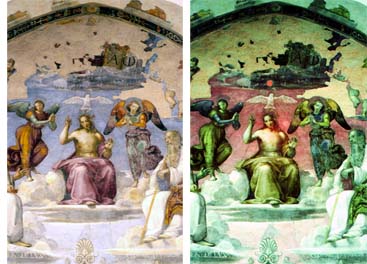About the chemical structure:
| Chemical name: | A complex sulfur-containing sodium aluminum silicate |
| Formula: | Na8-10Al6Si6O24S2-4 |
| Crystal system: | Isometric - Hextetrahedral (at Mineralogy Database) |
| Refractive index: | 1.5 |
Color:
| Color Index (C.I.) | PB 29 |
How can you identify Ultramarine?
Imaging:
UVF: dark blue
FCIR: red

Raphael, Chapel of Saint Severo, 1505, Perugia, Italy
Left, visible image. Right IRFC image.
The blue sky shows up in red in the IRFC image being ultramarine.
OM: Mineral ultramarine has conchoidal blue flakes. Particles size can vary greatly however depending upon the extent and skill in preparation. Synthetic particles tend to be more uniform and finely divided. The artificial variety is distinguished microscopically from the natural by its more rounded finer particles.Particles are usually between 1-50μm in size.

.jpg)
Microscopic appearance at x500 mag. Left, artificial, right, mineral ultramarine.
Analytics:
It's identified by means of FTIR, UV/VIS/IR and Raman.
Raman spectra: University College London;
FTIR: IRUG
UV/VIS/IR spectra: US Geological Survey
Usage and handling:
| Permanence: | Toxicity: |
|---|---|
Lightfast: excellent Degradation processes: becomes quickly discoloured by the action of weak acids, which attack it forming hydrogen sulphide. Discoloured by alum and vinegar, which were often used in tempera. It may form a white coating/ blanching on its surface as a result of hydroscopic action. The so-called 'ultramarine disease' is said to be the result of decomposition of the varnish in oil paintings. |
non toxic MSDS: Kremer |
Literature:
Artists’ Pigments. A Handbook of Their History and Characteristics, Vol. 2: A. Roy (Ed.) Oxford University Press 1993, p. 37-66
Kurella, A. und Strauss, I., Lapislazuli und natürliches Ultramarin, Maltechnik-Restauro, 1983, p. 34-54
Seel, F. et al. Das Geheimnis des Lapis Lazuli, Chemie in unserer Zeit, 8, 1974 p. 65
(intro) - Azurite - Cerulean Blue - Cobalt blue - Egyptian blue - Prussian blue - Smalt - Ultramarine

